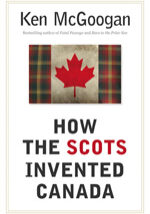In 701 B.C. the Assyrian empire was in its ascendancy. It had already vanquished the kingdom of Israel to the north including the capital at Samaria. It then prepared an assault on Judah and its capital at Jerusalem.
But in one of those significant events that changes the course of world history, Assyria was repelled. Jerusalem was saved until 586 B.C. when the Babylonians sacked the city, forcing its leadership class into exile.
Henry Aubin, in a major feat of scholarship, determines that Jerusalem was aided by a Kushite army from Africa which had marched northeast from the Nile valley. While the Bible attributes the Assyrian retreat to an angel and secular commentators cite pestilence, Aubin, in a meticulously documented work, demonstrates that an alliance with the African nation of Kush bolstered Jerusalem’s defences.
Kush, also known as Nubia, was located in what is now southern Egypt and northern Sudan. A monarchy that existed for more than 1000 years, from 900 B.C. to A.D. 350, Kushites held sway over Egypt from 712 B.C. to about 660 B.C. Of Egypt’s 31 dynasties, this, the 25th Dynasty, is the only one that all scholars agree, was black.
The commander of the Kushite expeditionary force was Taharqa (or as the Bible calls him Tirhakah). This Kushite prince, who had his own interests in halting Assyrian expansion, likely caught the aggressors by surprise as they prepared their siege of Jerusalem.
Aubin offers a thrilling military history and a stirring political analysis of the ancient world. He also sees the event as influential over the centuries.
The Kushite rescue of the Hebrew kingdom of Judah enabled the fragile, war-ravaged state to endure, to nurse itself back to economic and demographic health, and allowed the Hebrew religion, Yahwism, to evolve within the next several centuries into Judaism. Thus emerged the monotheistic trunk supporting Christianity and Islam.

“…[written with] lively intelligence and [a] keen eye for detail…How the Scots Invented Canada provides a pleasurable way to get to know many of the most colourful men and women in our history.”
Globe & Mail
“McGoogan’s How the Scots Invented Canada is certainly an inspired work and its author is rapidly becoming the rightful successor to populist historian Pierre Berton.”
Toronto Star
“…an unusual and engaging survey of Canadian history from a Scottish perspective.”
Canadian Geographic
“Not all the Scots and Scottish-Canadians McGoogan writes about were nice people. The pious, sanctimonious, ruthless, overbearing, conceited and nasty are represented, as well. But, all in all, there are about five million good reasons to read McGoogan’s book.”
Winnipeg Free Press
“This new book will appeal to a wide audience.”
The Ottawa Citizen
“an exuberant celebration of the building of a nation.”
Forargyll, Scotland
“McGoogan’s How the Scots Invented Canada isn’t presenting Scottish influence as absolute on the evolution of Canada, but certainly an essential one. Part of what makes this book different and even essential, apart from the sheer amount of research that has gone into it, is just how far McGoogan moves into modern times, citing more contemporary Scots as an ongoing influence. A magnificent, rich compilation of Canadian (and Scottish) histories. . . “
Author Rob McLennan
HarperCollins Canada 2010
How the Scots Invented Canada
No matter where you enter the history of Canada – through exploration, politics, business, education or literature — you find that the Scots and their descendants have played a leading role. Today, almost five million Canadians identify themselves as Scottish, and their influence is felt throughout the land. Starting with his own deep roots in Scotland and early Canada, Ken McGoogan has created a lively, entertaining narrative that focuses on more than sixty Scots who have led the way in shaping this country.
Early arrivals included explorers Alexander Mackenzie, Simon Fraser and the “Scotch West Indian,†James Douglas. Later, Scots such as Lord Selkirk and John Galt encouraged thousands to immigrate. Nation-builders followed, among them John A. Macdonald, James McGill and the reformer Nellie McClung. Then came the visionaries, Scottish Canadians such as Tommy Douglas, Doris Anderson and Marshall McLuhan, who have turned Canada into a nation that revels in diversity.
McGoogan commemorates the first settlers to land at Pictou, Nova Scotia, and celebrates such hybrid Canadians as the Cherokee Scot John Norton, Thérèse MacDonald Casgrain and the kilt-loving John George Diefenbaker. He honours the war contributions of Scottish Canadian regiments, and he toasts Sir Walter Scott and the beloved Robbie Burns. Beautifully illustrated and handsomely packaged, How the Scots Invented Canada is an exuberant celebration of the building of a nation.
Ken McGoogan is the bestselling, author of three previous books on Arctic explorers and adventurers, Fatal Passage, Ancient Mariner and Lady Franklin’s Revenge. His awards include the Christopher Award, the Pierre Berton Award, the Drainie-Taylor Biography Prize. Fatal Passage, the story of explorer John Rae and his confrontation with Lady Jane Franklin and Charles Dickens, has been adapted for a film, which has debuted theatrically and will be released on UK, US and Canadian TV in 2008.
Reviews
How the Scots Invented Canada in the Globe & Mail:
http://tinyurl.com/37hefkv
A review of How the Scots Invented Canada in the Ottawa Citizen:
http://tinyurl.com/374l2eo
Other links
http://www.kenmcgoogan.blogspot.com
http://www.youtube.com/watch?v=aeuGZkSNPPQ
To find out more about the award-winning documentary Passage, based on Ken McGoogan’s award-winning book Fatal Passage, please click here:
http://www3.nfb.ca/webextension/passage/